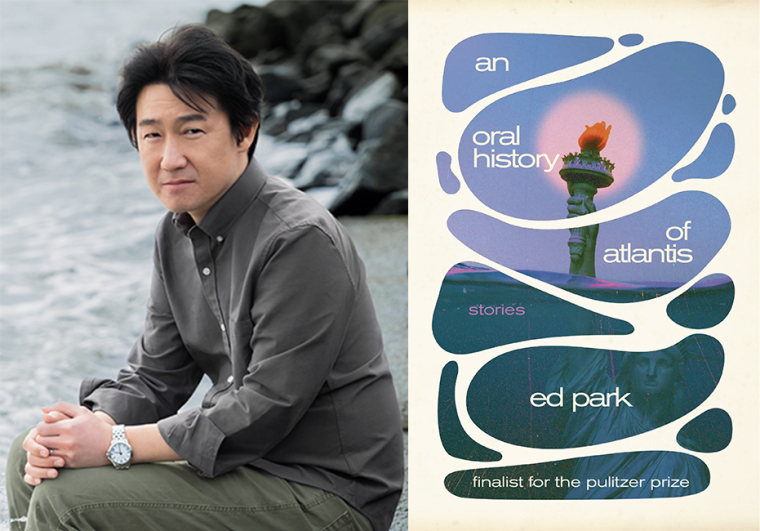This week’s installment of Ten Questions features Ed Park, whose story collection An Oral History of Atlantis, is out today from Random House. An Oral History of Atlantis has a cast of characters that includes a college student who receives a chance role in a friend’s movie, a man coming to terms with his life via the passwords he struggles to remember, and a director and faded film star discussing science fiction, bad costume choices, and lost loves on a commentary track for a B-film from the eighties that neither remembers very well. In Park’s story collection characters lament their fleeting youth, focus on their breathing, meet cute, break up, write book reviews, translate ancient glyphs, bid on stuff online, whale watch, and occasionally find solace in the sublime. In stories full of his trademark wit, Park creates a world that is both strikingly familiar and wonderfully different from our own. Kaveh Akbar calls the collection “dazzling” and a “steady carousel of delight and stunned awe.” Yiyun Li agrees, calling Park “a magician of storytelling.” Ed Park is the author of the novels Personal Days (Random House, 2008) and Same Bed Different Dreams (Random House, 2023). He is a founding editor of the Believer, and has worked in newspapers, book publishing, and academia. His writing appears in the New Yorker, the New York Review of Books, Harper’s Magazine, the Atlantic, and elsewhere. Born in Buffalo, he lives in Manhattan with his family.

Ed Park, author of An Oral History of Atlantis. (Credit: Beowulf Sheehan)
1. How long did it take you to write An Oral History of Atlantis?
The first story in the book was written in 1997, so it’s not an exaggeration to say “over a quarter century.” I wrote these stories during and in between novel writing, often but not always getting them published (sometimes years after their composition). I didn’t consciously see the connections between them until much later, and organizing them in a coherent way was more the work of the last few years. This sometimes meant throwing out worthy stories that didn’t fit the overall tone.
2. What was the most challenging thing about writing the book?
Story writing is often pure pleasure for me, which means I’ll write stuff straight through, in days or even hours, or else abandon things that don’t take off after a page. That’s okay. On the other hand, sometimes I’ll get stuck on a story, forget about it for months or years, then think about it again and fish it out and finish it. (I like when that happens.)
Unlike with my novels, in which the longer form necessitates innumerable come-to-Jesus moments and infinite tinkering, with An Oral History of Atlantis I just remember the miraculous appearance of story seeds, bursts of inspiration, and cloudless composition.
3. Where, when, and how often do you write?
Almost always at home, in my kitchen, in the mornings, every day, for as long as I can. (That’s what she said.)
4. What are you reading right now?
Mostly Dostoevsky’s The Brothers Karamazov and Judith Guest’s Ordinary People (Viking, 1976). But there’s a lot of other stuff, too—for pleasure, for novel research, for articles, for blurbage. The stacks are endless here.
5. Which author, in your opinion, deserves wider recognition?
David Gordon, one of the best comic crime writers ever. His dialogue and situations can be laugh-out-loud funny, but he can also unfold a diamond heist. His new one is Behind Sunset (Mysterious Press, 2025), set in L.A. in 1994, and it’s hilarious, filthy, and thrilling. And maybe the late Harry Mathews—Dalkey Archive Press is republishing a number of his books this fall, and I’ve written an introduction to his mind-blowing first novel, The Conversions.
6. What is the biggest impediment to your writing life?
I can’t complain. I make no excuses. Writing often feels painfully slow, but I realize my brain just needs time to figure out the next step.
7. What is one thing that your agent or editor told you during the process of publishing this book that stuck with you?
This has been a pretty smooth process. I think they were both entertained!
8. If you could go back in time and talk to the earlier you, before you started An Oral History of Atlantis, what would you say?
It might not seem like it now, but everything you finish will be published and will find readers.
9. Outside of writing, what other forms of work were essential to the creation of An Oral History of Atlantis?
Listening to the commentary track on an old Karen Black movie (Trilogy of Terror) directly inspired “Weird Menace.” (I miss the commentary experience.)
10. What’s the best piece of writing advice you’ve ever heard?
If something’s not working—just delete it! Put it in a separate file, marked “scrap,” so you can fish it out if you need it again. Chances are, you won’t need it. (Nobody actually told me this. It’s just something I’ve realized.)







